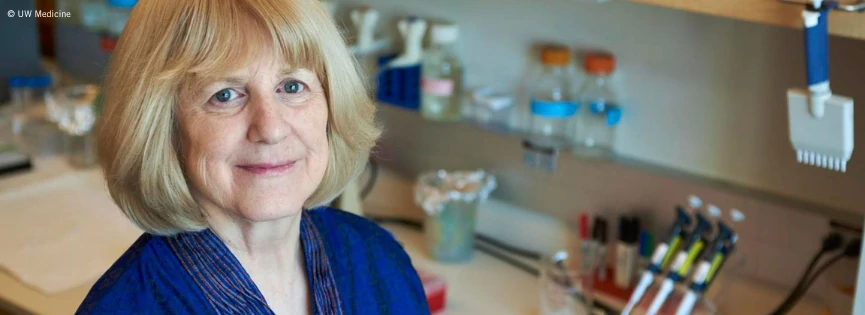Main content
Mary-Claire King 2025 Princess of Asturias Award for Technical & Scientific Research

Mary-Claire King (Chicago, USA, 27th February 1946) graduated cum laude in Mathematics from Carleton College (Northfield, Minnesota) in 1966 and subsequently completed her PhD thesis in Genetics under the supervision of Allan Wilson at the University of Berkeley. Between 1974 and 1976 she undertook a postdoctoral fellowship at the University of San Francisco, after which she returned to Berkeley as professor of Genetics and Epidemiology in the Department of Molecular and Cell Biology, where she worked until 1995. She then accepted an appointment as the American Cancer Society Professor at the University of Washington in Seattle, where she is also an affiliate member of the Fred Hutchinson Cancer Center, positions she continues to hold today.
Her doctoral thesis in evolutionary biology was even then considered to be of enormous significance, as she determined the extremely close genetic proximity between humans and chimpanzees (99% identical) through statistical analysis of protein similarity. In 1974, King began researching the origins of breast cancer with Dr Petrakis’ group. After many years of complex research and the development of new statistical models of population genetics and evolutionary genetics, in 1990 she managed to identify a gene called BRCA1 located on chromosome 17 and showed that mutations in this gene were involved in the development of certain types of breast and ovarian cancer. This work represented a paradigm shift not only in our understanding of the origins of cancer, a complex disease that was not previously suspected of having a genetic origin, but in its treatment as well. Subsequently, the study of this disease and other so-called rare diseases, such as Huntington’s disease and cystic fibrosis, began to be approached from a different perspective.
Mary-Claire King has also played a very important role in the application of genetics in the field of human rights, such as in cases of identifying missing persons and their descendants following the Argentine dictatorship and in other countries by means of the so-called “grandparentage index”. King worked with the Argentine grandmothers of the “disappeared” to establish the National Genetic Data Bank in Argentina, the first institution dedicated to systematically preserving genetic information for future identification. This work has led to the identification and reunification of 138 families to date. She has also recently made key contributions to the understanding of schizophrenia, providing evidence that the disorder arises from de novo mutations, a change in the DNA sequence of a gene that is observed for the first time in a person without having appeared in previous generations. These mutations damage genes that regulate neurogenesis in the foetal prefrontal cortex. By integrating genomics with neuroscience, she and her colleagues have played a pivotal role in uncovering the molecular foundations of schizophrenia and have provided new insights into its pathogenesis and potential therapies. According to Scopus, she is the author of 349 scientific papers, which have been cited 48 631 times, and has an h index of 106.
Mary-Claire King holds honorary degrees from more than twenty universities around the world and is a member of the National Academy of Medicine and the National Academy of Sciences of the United States, among others. In 2012, she was president of the American Society of Human Genetics and has held and continues to hold important positions in numerous public U.S. institutions and universities, such as the National Cancer Institute and other National Institutes of Health, as well as in those of international scope, such as the Scientific Council of the WHO. She has received numerous awards, including the University of California Medal (2004), the Women in Science Award from the Weizmann Institute of Israel (2006), the Lasker-Koshland Special Achievement Award in Medical Science (USA, 2014), the U.S. National Medal of Science (2016), the Shaw Prize in Life Sciences and Medicine (Hong Kong, 2018), the Mendel Medal from the Genetics Society of the United Kingdom (2018), the Canada Gairdner International Award (2021) and the Public Welfare Medal from the U.S. National Academy of Sciences (2025).
End of main content
